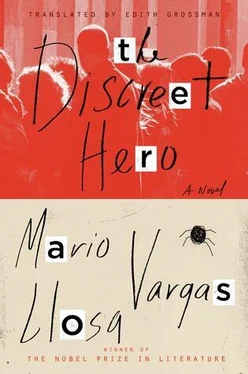Captain Silva stood and Lituma followed his lead. “We’ll give you round-the-clock protection,” the chief assured them again as he was leaving. “Don’t worry, señora.” Mabel and Don Felícito didn’t accompany them to the door; they remained in the living room, she whimpering and he consoling her.
Outside a torrid sun awaited them, along with the usual spectacle: ragged street kids kicking a ball, emaciated dogs barking, piles of trash on the corners, peddlers, and a line of cars, trucks, motorcycles, and bicycles competing for the road. Turkey buzzards weren’t only in the sky; two of the hideous birds had landed and were picking through the garbage.
“What did you think, Captain?”
His boss took out a pack of black-tobacco cigarettes, offered one to the sergeant, took another for himself, and lit both with an old dark green lighter. He took a long drag and exhaled smoke rings. He had a very satisfied expression on his face.
“They fucked up, Lituma,” he said, pretending to punch his subordinate. “Those assholes made their first mistake, just what I was waiting for. And they fucked up! Let’s go to El Chalán, I’ll buy you a nice fruit juice with lots of ice to celebrate.”
He was grinning from ear to ear and rubbing his hands together the way he did when he won at poker, or dice, or checkers.
“That woman’s confession is pure gold, Lituma,” he added, inhaling and exhaling the smoke with delight. “You saw that, I suppose.”
“I didn’t see anything, Captain,” a disconcerted Lituma confessed. “Are you serious or are you kidding me? I mean, the poor woman didn’t even see their faces.”
“Damn, what a bad cop you are, Lituma, and an even worse psychologist,” the captain said mockingly, looking him up and down and laughing out loud. “Shit, I don’t know how you ever got to be a sergeant. Not to mention my assistant, which is saying a lot.”
Again he murmured to himself: “Pure gold, yes sir.” They were crossing the Puente Colgante and Lituma saw that a group of street kids were swimming, splashing, and carrying on along the sandy banks of the river. He’d done the same things with his León cousins a million years ago.
“Don’t tell me you didn’t see that our smart Mabelita didn’t say a single word that was true, Lituma,” the captain added, becoming very serious. He puffed on the cigarette, exhaled the smoke as if defying heaven, with triumph in his voice and eyes. “All she did was contradict herself and tell us a damn pack of lies. She tried to stick it to us. And stick it up our asses too. As if you and I were a couple of real pricks, Lituma.”
The sergeant stopped dead, stunned.
“What you’re saying, are you serious, Captain, or are you putting one over on me?”
“Don’t tell me you didn’t see what was so obvious and so clear, Lituma.” The sergeant realized that his boss was speaking very seriously, with absolute conviction. As he spoke he looked at the sky, blinking constantly because of the glare, exalted and happy. “Don’t tell me you didn’t see that sad-assed Mabelita was never kidnapped. That she’s an accomplice of the extortionists and went along with the farce of the kidnapping to soften up poor Don Felícito, who she also wanted to fleece. Don’t tell me you didn’t see that thanks to the mistakes of those motherfuckers, the case is practically solved, Lituma. Rascachucha can rest easy and stop driving us fucking crazy. Their bed is made, and now all we have to do is lay hands on them and push them over the edge.”
He threw the butt into the river and began to laugh out loud, scratching at his armpits.
Lituma had taken off his kepi and was smoothing down his hair.
“Either I’m dumber than I look or you’re a genius, Captain,” he declared, demoralized. “Or crazier than a coot, if you’ll excuse me.”
“Better believe I’m a genius, Lituma, and besides, I know all about people’s psychology,” the exultant captain assured him. “I’ll make you a prediction, if you like. The day we arrest those thugs, which will happen very soon, as there’s a God in heaven I’ll fuck my darling Señora Josefita up the ass and break her cherry and keep her shrieking all night long. Hooray for life, damn it!”
“Did you find poor Narciso?” asked Señora Lucrecia. “What happened to him?”
Don Rigoberto nodded and collapsed, exhausted, in a chair in the living room of his house.
“A real odyssey,” he said, sighing. “Ismael did us no favor by involving us in his troubles in bed and with his children, my love.”
The relatives of Narciso, Ismael Carrera’s driver, had made an appointment to meet Rigoberto at the first gas station at the entrance to Chincha, and he drove on the highway for two hours to get there, but when he arrived no one was waiting for him. He spent a long time in the sun watching trucks and buses go by and swallowing the dust that a hot wind from the sierra blew into his face, and when he’d had enough and was tired and ready to go back to Lima, a little black boy appeared and said he was Narciso’s nephew. Very dark-skinned and barefoot, he had large, effusive, conspiratorial eyes. He spoke in such a roundabout way that Don Rigoberto barely understood what he was trying to tell him. Finally, it became clear that there had been a change of plan: his uncle Narciso was waiting for Rigoberto in Grocio Prado, in the doorway of the same house where the Blessed Melchorita (the boy crossed himself when he said her name) had lived, performed miracles, and died. Another half hour of driving on a dusty road filled with potholes, which ran between vineyards and small farms that grew fruit for export. In the doorway of the house-museum-sanctuary of the Blessed One, on the Plaza de Grocio Prado, Ismael’s driver finally appeared.
“Half in disguise, wearing a kind of poncho and a penitent’s hood so that nobody would recognize him and, of course, dying of fear,” Don Rigoberto recalled with a smile. “That black man was white with panic, Lucrecia. And really, it’s no wonder. The hyenas hound him day and night, it’s worse than I’d imagined.”
First they’d sent a lawyer, that is, a fast-talking shyster, to try to bribe him. If he appeared before the judge and said he’d been coerced into being a witness at his employer’s wedding and, in his opinion, Señor Ismael Carrera hadn’t been in his right mind on the day he married, they’d give him a gratuity of twenty thousand soles. When he replied that he’d think about it but in principle preferred not to have dealings with the judiciary or anyone in the government, the police showed up at his family’s house in Chincha with a summons. The twins had filed a complaint against him for complicity in several crimes, among them conspiracy and the abduction of his boss!
“All he could do was hide again,” Rigoberto continued. “Fortunately, Narciso has friends and relatives all over Chincha. And it’s lucky for Ismael that he’s the most upright and loyal fellow in the world. In spite of how frightened he is, I doubt those two thugs are going to break him. I paid him his salary and gave him a little extra, just in case, for anything unforeseen. This business gets more complicated every day, my love.”
Don Rigoberto stretched and yawned in the easy chair in the living room, and while Doña Lucrecia prepared lemonade, he stared at the ocean of Barranco for a long time. It was a windless afternoon and several hang gliders were in the air. One passed by so close he could clearly see his head encased in a helmet. Damn mess, happening now when he was supposed to begin a retirement he thought would be dedicated to rest, art, and travel — that is, to pure pleasure. Things never worked out as planned: It was a rule with no exceptions. “I never imagined my friendship with Ismael would turn out to be so onerous,” he thought. “Much less that I’d have to sacrifice my small piece of civilization for it.” If the sun had been out, this would have been Lima’s magical time. A few minutes of absolute beauty. The fiery ball would sink into the sea on the horizon behind the islands of San Lorenzo and El Frontón, burning up the sky, turning the clouds pink, and for a few minutes putting on a show, both serene and apocalyptic, that signaled the onset of night.
Читать дальше

![Гарри Гаррисон - Bill, the Galactic Hero [= The Starsloggers]](/books/87536/garri-garrison-bill-the-galactic-hero-the-star-thumb.webp)










